SRQ DAILY Feb 25, 2017

"As the world and U.S. population grows, those low-skill, middle class sustaining jobs just aren't as abundant as they used to be. "

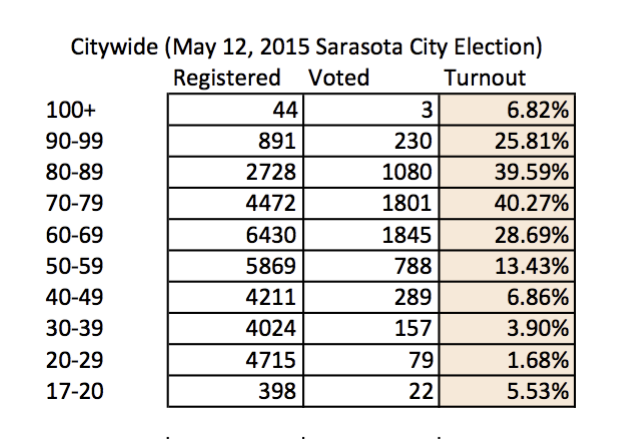

Legendary consultant Andres Duany never composed a city plan without courting some controversy. That’s partly because his big-picture vision for communities extends beyond setbacks and parking requirements. During an interview I conducted seven years ago with Duany, around the 10-year anniversary of the Sarasota Downtown Master Plan he helped craft, his boldest suggestions for the future weren’t about urban transects or height restrictions but about engaging younger generations.
“The best places are great because the young people say ‘We own this place,’ ” he told me. “You have got to let the young people run Sarasota.” He went so far as to suggest the city commission’s make-up be determined not be geographic districts but by age group, with seats dedicated for commissioners in their 20s, 30s, 40s, 50s and 60s. “Those in their 70s and older don’t matter anymore. They should just go home and have a good time. Government is about the future.”
I wonder how much longer Duany, 67, will sustain such a view, but his assertion interested me then and fascinates me now. It seems especially relevant during a renewed effort to get young professionals involved in civic affairs. SRQ Media Group’s first SB2 Rumble, a modified Oxford-style debate scheduled this Tuesday at the Powel Crosley Estate, explores the question “Has Our Region Failed Our Young Professionals?” Earlier this month ago, Sarasota Underground hosted a well-attended City Commission forum aimed at putting a younger spin on city dialogue. Of course, the real test of whether young people themselves will raise their own voice when it comes to city business comes March 14 when voters decide who should fill two city commission seats.
Frankly, history doesn’t deliver a great indication young voters will step up. The last time a city election was held, in May 2015, Sarasota voters under the age of 40 had an abysmal 2.82 percent turnout. By comparison, voters over age 70 boasted a turnout of 38.28 percent. In raw numbers, that means voters over 70 outnumbered under-40 voters 3,114 to 258. You can see who owns the place and who decided to go home and have a good time.
So why does this happen? In so many ways, the task of engaging younger voters appears daunting. Not only were young voters outnumbered 10-1 last bout, but the unseasoned set has its own challenges. Seniors living full-time in Sarasota, an enormous number of whom are retired, have largely decided to make this community home until they die. Meanwhile, many 20-somethings remain in the early stages of their careers and see the future drawing them elsewhere.
Yet, Sarasota may be the best place in the Gulf Coast region for young professionals to take control. A little known fact, registered voters under 40 outnumber those over 70 in the city. That’s starkly different from countywide figures or places like Venice and Longboat Key. Young people tend only to get involved when limited issues enter the public square. But don’t expect elected officials to worry about a noise ordinance silencing your midnight concert or event restrictions shutting down your favorite Millennial-led festival downtown if your grandparents are the only ones in your family who can name a city commissioner.
Duany’s idea of a perfect commission can’t really be done. And considering the 70-plus set seems so engaged, it would be a bit undemocratic to do something like it here. But if young people want to take ownership of the city, there’s an easy solution. Show up on March 14. Then again for the runoff in May. And don’t let politicians think this demographic will ever stay home for a city election again. 


There are plenty of misconceptions and myths about creativity. For example: “It’s magic.” “It’s random.” “It just comes to you.” Or the common remark, “Some people have it; some don’t.”
One of the most dangerous misconceptions is that thinking creatively does not demand research, data or analysis. On the contrary, creative problem solving is at its best when it springs from knowledge and preparation.
Ringling College of Art and Design, and all other members of the Association of Independent Colleges of Art and Design in our country, educate emerging artists and designers in this school of thought: creativity is a skill that is based on having a solid foundation of knowledge and discipline.
Earlier this week, Jared Cohen, president of the Google-owned company Jigsaw, addressed an audience of over 1,600 people at the Ringling College Library Association’s Town Hall Lecture Series at the Van Wezel Performing Arts Hall. Cohen, former staffer for both Condoleezza Rice and Hillary Clinton, laid out the ideas he’s gleaned from his experience about the future of technology and the omnipresence and ever-important role of data in our society.
In essence, he forwarded the ideas that technology, data and the digital world are rapidly becoming one with our physical world—and that we should embrace the evolution. More succinctly, he claimed, “Data is the new oil.” This comes as no surprise, since it was the founder of the think tank Google Ideas who said it.
Such a statement may ring familiar. When I speak about creativity and its importance to our future economy, I often use the phrase, “Creativity is the new oil.” After all, it fuels and bolsters every successful industry and company on our planet. Creative thinking will always be in demand—today more than ever. And the key to creative thinking? Steeping ideas in data and information. The more we know about our audiences, our products, our services, our goals and our results, the more refined and targeted our creative ideas can be. Without a doubt, “data” and “creativity” work hand in hand to fuel our economy.
This ideology is reflected in every facet of our programs, facilities, and curriculum at Ringling College. Our students, who are among the most successful creatives, will enjoy and accept the ever-changing data climate we live in. They will stay at the forefront of their industries by utilizing every piece of information they can get their hands on. While somewhat perplexing, the beauty lies in the intersection of data and creativity, and the fact that their delicate balance will drive our future.
Dr. Larry R. Thompson is president of Ringling College of Art and Design. 

Titles and leaders are two different things. I’ve been reminded of this early and often in my work at Gulf Coast Community Foundation.
Take the Gulf Coast board of directors. Their collective résumé lists bona fides that would rival any organization of our kind. But they are more than a board full of titles. They are a board of courageous leaders. They allow Gulf Coast to take calculated risks, venture into new territory and redefine what it means to be a community foundation. It’s what I so admire and rely on in them.
Right now, we need more service-above-self leadership from all sectors. Fortunately, there seems to be a swell of interest across our demographic and political spectrums in local, action-oriented leadership. Where such waves originate is open to debate. But the more productive question to me is, How do we help aspiring leaders turn instinct and inspiration into positive impact?
I turned to the curriculum of our annual Gulf Coast Leadership Institute for some ideas to share. Louise Hill, the University of Georgia faculty member who expertly leads this program, reminded me of five behaviors of exemplary leaders that she discusses with every leadership class.
The practices were identified by academics Jim Kouzes and Barry Posner in their 30-year-old book The Leadership Challenge. Paraphrased and ordered in the way Louise likes to address them, they are:
- Challenging the process
- Inspiring a shared vision
- Enabling others to act
- Modeling the way
- Encouraging the heart
You can explore these behaviors further in Kouzes and Posner’s book or on its companion website. (Or by applying for this year’s Leadership Institute!)
Whether it’s planning the future of Sarasota’s Bayfront or trying to address the causes and effects of an issue like homelessness, leaders would do well to employ and embody the practices listed above. From my own experience, I’ll add an underlying approach in executing each of them: Be authentic. Over the long haul—and leading is a long haul—authenticity matters.
The best community leadership is about the community, not the leader. As Martin Luther King Jr. said, “Everybody can be great, because everybody can serve.”
Mark Pritchett is president and CEO of Gulf Coast Community Foundation. 


Over the past few weeks, the Sarasota Police Department and police agencies around the country have been called upon to respond to major protest marches in our communities. Police agencies are challenged to remain calm and neutral in the face of potential provocation, while protecting public safety along with the first amendment rights of citizens to protest. I am pleased to report that the SPD, as well as the thousands of local protestors who gathered in downtown Sarasota, conducted themselves well.
Is what we see simply a short-term, post-election reaction by those who did not like the results of our national elections? Or did those elections represent some deeper fundamental circumstances we as a society have to work through? As a City Manager trying to anticipate the summer of 2017, I am beginning to think it is the latter.
If we take a moment to reflect upon the many disruptions that have occurred in our economy over the past 40 years, it's quite amazing. And to a large degree, it was a theme in the last national election cycle.
As the world and U.S. population grows, those low-skill, middle class sustaining jobs just aren't as abundant as they used to be. iPhones, GPS, Uber, Netflix, Twitter, Drones, Big Data, Robots, Artificial Intelligence, Climate Change, Text Messaging and supposedly soon “driverless cars” have changed and will continue to change the world as we once knew it.
These rapid-fire technological innovations, knowledge breakthroughs and persons behind them have all disrupted life and our economy.
A few years ago, I had the very fortunate opportunity to know and work with Robert Galvin, patriarch of Chicago-based company Motorola and a big time disrupter. Bob was a key figure behind the push to deregulate the telephone monopolies. His efforts, company and vision helped lay the foundation for the telecommunications revolution, which resulted in a smartphone in almost everyone’s purse or pocket. Bob was an amazing entrepreneur, but also an idealist who thought open and fair competition combined with advances in technology could solve most of humanity’s challenges. Late in life, he turned his focus to revolutionizing the energy sector. I remember Bob Galvin fondly almost every time I do Facetime with my grandson in Brooklyn, or when I see a solar panel on a private residence.
It seems good has come from most of the disruption, unless it was your job, pension or family that was impacted negatively by advancing technology. For many, the tech-driven disruptions create moments of nostalgic longings for simpler, more stable times.
On the other hand, the torrent of change has stirred a sense of excitement, democratized communications, advanced longer life, and, in many, created an optimistic sentiment that anything can be accomplished.
But our world is not perfect just yet. Some of the biggest challenges we face domestically, and in the world, are rooted in cultures and people having difficulty adjusting to, or accepting, the many sweeping changes they feel our western, modern, hi-tech culture has foisted upon them.
New generations with new dreams are ready to weigh in. And older folks who participated or observed the social justice and anti-war movements of the 1960s and 1970s aren't done just yet. They have taken to the streets.
As our local governments strive to keep the peace and prepare for the fallout of what may be the long, hot summer of 2017, I often wish we could figure out a way to disrupt or calm disruption for a while. It would be great if our political and business sectors would work earnestly to recalibrate our society to be wise, fair and stable. An emphasis is needed on prioritizing policies aimed toward adapting to our new era and responding adeptly to unintended consequences of economic change.
If Washington and the media ever asked us what regular people think, I suspect they would hear that we should tone down rhetoric and turn up collaboration. In the richest country in the history of the planet, how about just agreeing on some basic principles to take the edge off the continuous shifts and disruptions.
It may be impossible to disrupt disruption; we probably really don't want to. But acknowledging, planning for and adapting to this new reality of modern life may be the forward-thinking strategy we need to smooth the jagged edges and ease the surprises, anxieties and potential disasters of the powerful influences economic and technological disruption will continue to present. An America that has everyone’s back may help us work through our more challenging philosophical divides.
Robert Galvin thought we were smart enough to encourage fairness and innovation. He knew good leaders take us in new directions and change with the times. Most Americans I know have similar thoughts.
Every 50 years or so, America is forced to recalibrate. It appears that time is again near.

Exit 209 is supposed to be different, not a typical highway interchange. The Sarasota lands at Fruitville Road, just east of Interstate-75 and north of Palmer Boulevard, have been slated for high quality development for over a decade. Instead of a collection of gas stations and industrial uses, our community vision includes walkable development (the Fruitville Initiative, a taxpayer-funded $500,000 plan), healthcare or information technology businesses, work/live units for artists and an unexpected bonus. The adjacent Celery Fields, a $24-million flooding prevention project, has fortuitously become a national and international birding ecotourism draw. So big that Sarasota Audubon invested $1 million for a new Celery Fields visitor center. Yet, recent Planning Commission votes have paved the way for changing rural public acreage next to the Celery Fields into ordinary, polluting, industrial development. The County Commission can reverse course, respect a community vision with millions of dollars and over a decade of planning invested, or they can sell out to their preferred bidders.
How did we get here? Last spring, the County put the southwest and northwest corners at Apex Road and Palmer Boulevard, public land next to the Celery Fields, up for sale. The 12- and 7-acre parcels are currently designated Open Space or Rural uses. The County received exactly one bid for each parcel of land. You read that right—one bid. Getting only one bid for each public land offering is reason enough for concern.
Who are these “winning” bidders—buyers who face no competition, buyers poised to purchase public land near a wildlife refuge, bidders who will only buy if they are permitted to develop these rural lands for industrial uses?
The bidder for the 12 acres at the southwest corner is a company owned by an elected County official, James Gabbert. Gabbert serves on Sarasota’s Charter Review Board. Mr. Gabbert served on the CRB alongside Mark Hawkins (both representing District 4) until Hawkins resigned from the CRB for a position on the Planning Commission. Hawkins is one of the Planning Commissioners who approved the Mr. Gabbert’s petition for a Critical Area Plan change for the southwest lot from rural to industrial use. The industrial CAP change is required build the waste transfer facility described in Mr. Gabbert's uncontested bid for the public’s 12 acres.
Who exactly is the bidder for the seven acres at the northwest corner? Presiding County Attorney Alan Roddy advised the Planning Commission at their Feb. 2 meeting that the corporate entity(ies) which bid on the northwest corner lot may fail to meet County transparency standards. Our County Charter requires purchasers of public lands be identified as human beings. The attorney for the opaque purchaser(s) call the transparency provision “archaic.” The private entity bid, once again the only offer submitted for the rural public acreage, requires an industrial CAP change to build the wholesale depot.
This is how bad planning happens: one decision at a time. Uninspired at best and damaging at worst, approving industrial land use near a premier ecotourism wildlife habitat would be a spectacular betrayal of community planning, interest and investment. The Sarasota Board of County Commissioners can embrace our community vision and chart a different course.
Cathy Antunes serves on the board of Sarasota Citizens for Responsible Government. 

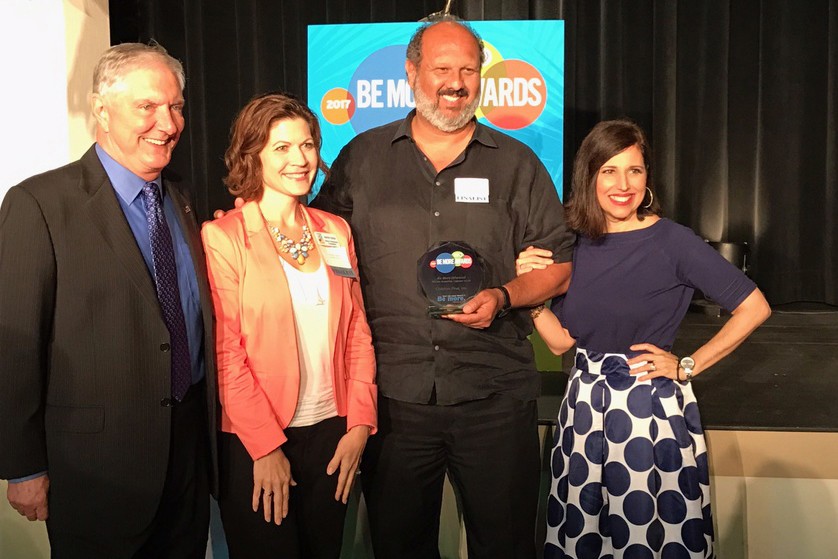
Children First was awarded the WEDU Be More Informed Nielsen Marketing Campaign Award during the 2017 WEDU Be More Awards Luncheon & Ceremony in Tampa on February 23 for its Raise Your Hand campaign. The award recognizes the execution of creative and result-driven original marketing campaigns using multimedia platforms. The Raise Your Hand Campaign, which officially launched in April 2016, is a $3.8 million initiative to expand services for at-risk children and their families in Sarasota County. The organization has raised more than 90% of its goal for the campaign at this time and is still gratefully accepting donations. 
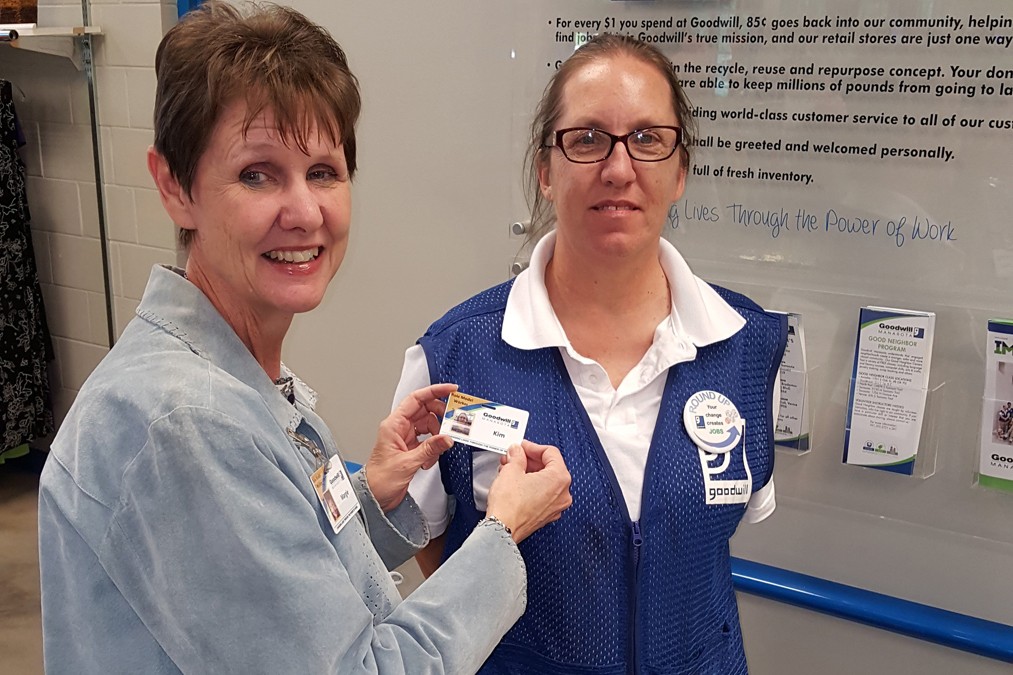
Goodwill Manasota knows that its employees are its most important resource, investing significantly in thousands of hours of on-the-clock training for their team members each year. Through the Role Model Worker program, which was started in 2003, team members gain a multitude of additional skills that they can add to their resume after they graduate. These might include budgeting, conflict resolution, time management, stress and anger management, team building, motivation, leadership, ethics and self-determination. The Role Model Worker Program addresses workforce development issues, which are crucial to work and life success. 
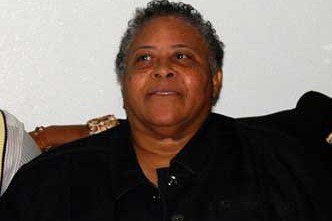
The Sarasota YMCA’s Safe Children Coalition hosted a celebration for Sarasota and Newtown community member, Jackie Swain for her long time commitment to foster care. Mrs. Swain has fostered over 100 children over the past 40 years, most of whom were teenagers. She is now “Mom” to over a dozen and “Grandma” to over 50 children. “Fostering is like breathing to me,” Swain said. “Sometimes it’s hard to breathe, sometimes it’s easy. I have enjoyed it.” Today, there are over 1,500 children receiving services through the Sarasota YMCA Safe Children Coalition as a result of abuse, neglect or abandonment. 

According to an independent economic impact analysis commissioned by Sarasota County Government, the Baltimore Orioles generate approximately $89 million in annual economic impact back to taxpayers and residents. This is accomplished through the club’s marketing and promotion of Sarasota tourism to its fan base across seven Mid-Atlantic states combined with the commercial activity and corporate presence of the Orioles’ athletic training headquarters, production of public sporting and other entertainment events, and management of youth sports tournaments and recreational programs. The Orioles’ $89 million economic output is a record for sports tourism creation in Sarasota County, far surpassing any current or past sports facility or private sports operator. This is more than two and a half times the $35 million impact the Orioles originally projected prior to the relocation of the Orioles’ year-round training headquarters, unique tourism marketing, and community sports park concept to Sarasota. 
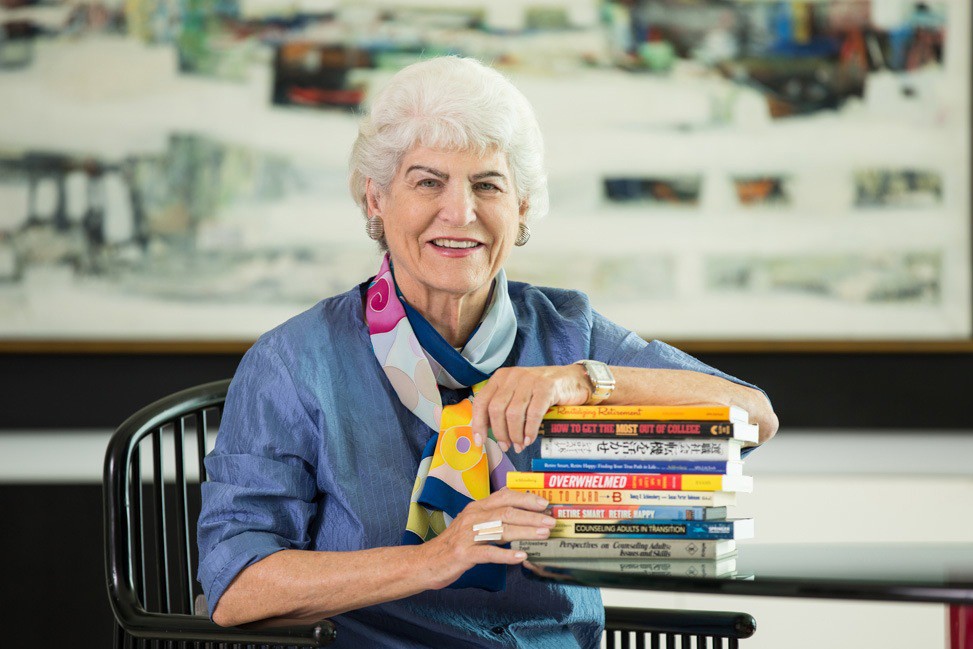
Dictators & Sports, Everything You Think You Know about Contracts, but Don’t, 1950’s TV, Sherlock Holmes: Iconic Character, iPhone for Beginners, A History of Comedy, Financial Survival for Retirement and Healthy Aging: Your Life, Your Health. There are only a sampling of the more than 60 in-depth courses offered this fall by Ringling College’s Lifelong Learning Academy. Weekly classes run two-eight weeks. No refunds on lectures, workshops or special events, however, registration is transferrable. 

The Sarasota Bradenton International Airport (SRQ) will be enrolling passengers in the TSA PreCheck expedited screening program from March 13 through March 17. TSA PreCheck is an expedited screening program that enables identified low-risk air travelers to enjoy a smart and more efficient screening experience. For TSA PreCheck travelers, there is no need to remove shoes, 3-1-1 liquids, laptops, light outerwear or belts. Today, TSA PreCheck has more than 450 lanes at 167 US airports. 
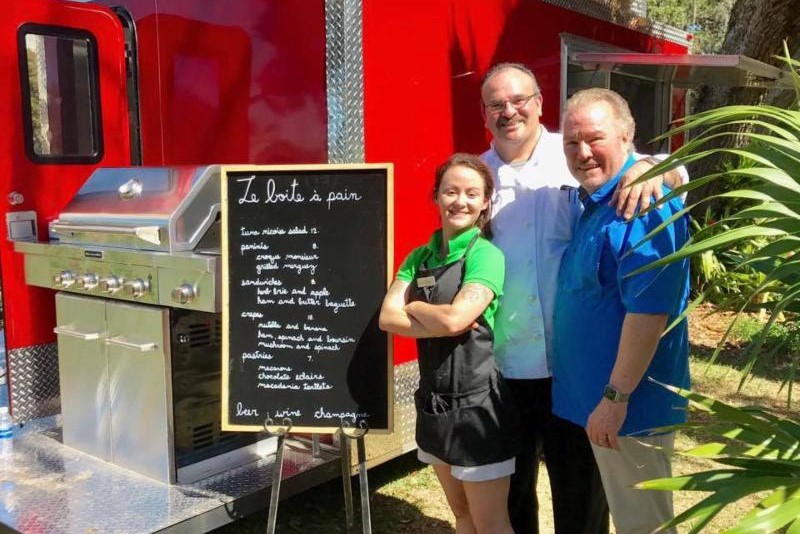
Michael’s On East recently debuted their new food truck La Boîte à Pain at Selby Garden offering French street food in celebration of Selby’s current exhibit, Marc Chagall, Flowers, and the French Riviera: The Color of Dreams. Michael's is the exclusive culinary partner for the Gardens, and will feature remarkable French delicacies in the Selby House Café and at many events throughout the Gardens' special six-month exhibition. Located within the historic Selby House on-premise at Selby Gardens, the Cafe as well as the new food truck is open to Gardens visitors and members. 

SRQ DAILY is produced by SRQ | The Magazine. Note: The views and opinions expressed in the Saturday Perspectives Edition and in the Letters department of SRQ DAILY are those of the author(s) and do not imply endorsement by SRQ Media. Senior Editor Jacob Ogles edits the Saturday Perspective Edition, Letters and Guest Contributor columns.In the CocoTele department, SRQ DAILY is providing excerpts from news releases as a public service. Reference to any specific product or entity does not constitute an endorsement or recommendation by SRQ DAILY. The views expressed by individuals are their own and their appearance in this section does not imply an endorsement of them or any entity they represent. For rates on SRQ DAILY banner advertising and sponsored content opportunities, please contact Ashley Ryan Cannon at 941-365-7702 x211 or via email |
Powered by Sarasota Web Design | Unsubscribe












